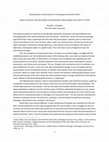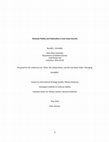Books by Randall Schweller

International Journal of Korean Unification Studies, 2014
This paper applies a neoclassical realist approach that combines systemic-and domestic-level vari... more This paper applies a neoclassical realist approach that combines systemic-and domestic-level variables to explain important aspects of the current global delegitimation phase. The key unit-level variable is nationalism, which interacts with structural-systemic factors to create unexpected behaviors for both the rising power and its threatened neighbors. With respect to China, nationalism interacts with its power status and trajectory to produce an increasingly assertive foreign policy regardless of whether it continues rising or stalls. With respect to China's neighbors, nationalism makes it easier for leaders to mobilize public support for military preparation and sacrifices associated with internal balancing behaviors. But nationalism and other powerful domestic factors interact with system structure to constrain China's neighbors from aligning with each other. These domestic restrictions that reduce the apparent flexibility of alliances under multipolarity partly explain the puzzling absence of a counterbalancing coalition against a rising and increasingly assertive China.

The Chinese Journal of International Politics, 2018
China's new assertiveness and the sudden inward turn of United States are a function of causes lo... more China's new assertiveness and the sudden inward turn of United States are a function of causes located in both the second and third images. The key second-image variable is nationalism, which combines with the power trajectories (a third-image variable) of both China and the United States to define how their relationship will unfold in the coming years. The interaction between nationalism and power trajectory produces entirely different foreign policy orientations in rising and declining powers-the former embraces an outward-looking, extroverted foreign policy of expansion, while the latter adopts an inward-looking, introverted foreign policy of restraint and retrenchment. The resurgent nationalisms of the rising challenger and the declining hegemon are entirely compatible with a future relationship characterized by peace and harmony. Obviously, the two nationalisms pose no inherent conflict of interests: China currently wants more global influence; the Unites States wants less. Hence, there is good reason to expect a soft landing as the world moves from unipolarity to bipolarity.
Book Reviews by Randall Schweller
Papers by Randall Schweller

The British Journal of Politics and International Relations, 2019
The problem of international order emerges in high relief at the conclusion of massive wars among... more The problem of international order emerges in high relief at the conclusion of massive wars among the major powers, when the victors have had to decide whether and how to shape the postwar landscape. 1 Until the 1900s, these momentous junctures in world history-consequential enough to be variously called 'constitutional moments', 'epochmarking' events, or 'tectonic shifts'-arose only once a century: 1648, 1713, and 1815. The last century witnessed three such moments: 1919, 1945, and Christmas Day 1991, when Soviet President Mikhail Gorbachev signed a document officially terminating the Soviet Union with a pen he borrowed from the CNN crew covering the event. 2 The immediate problem for the winners, aside from the inevitable disputes about how to divide the spoils, is to decide the fate of the vanquished. Should the terms of the peace be severe or moderate? Should they be dictated to the losers or, instead, fashioned in such a way that the defeated powers view them as legitimate? Grave as these matters are, still more essential is whether the hegemon chooses to remain engaged with the world or return to the womb, leaving it to others to sort out the mess. For the hegemon's less fortunate allies in victory-upon whose territories the war was fought-the key question is: will the strongest state in the world use its preponderant power as an iron fist to dominate them, imposing a self-serving coercive order over the world or a large portion of it? Or will the hegemon, instead, use its enormous-artificially inflated and ultimately fleetingpower to overhaul international politics, reconstructing a world in tatters and building a legitimate, highly institutionalised, and, therefore, enduring order that commands the allegiance of most, if not all, other states. In short, the newly crowned king has a choice either to abandon, dominate, or transform the world-that is, to create legitimate global structures that define and defend the hegemon's preferred values, norms, interests, identities, and beliefs. This is the grand subject matter of G. John Ikenberry's After Victory (2001). Broadly speaking, the book explores the ways in which international institutions provide global
Oxford Research Encyclopedia of Politics, 2016
The balance of power-a notoriously slippery, murky, and protean term, endlessly debated and vario... more The balance of power-a notoriously slippery, murky, and protean term, endlessly debated and variously defined-is the core theory of international politics within the realist perspective. A "balance of power" system is one in which the power held and exercised by states within the system is checked and balanced by the power of others. Thus, as a nation's power grows to the point that it menaces other powerful states, a counter-balancing coalition emerges to restrain the rising power, such that any bid for world hegemony will be self-defeating. The minimum requirements for a balance of power system include the existence of at least two or more actors of roughly equal strength, states seeking to survive and preserve their autonomy, alliance flexibility, and the ability to resort to war if need be.

Cambridge Review of International Affairs, 2011
The standard view of contemporary unipolar politics is that systemic constraints impede the trans... more The standard view of contemporary unipolar politics is that systemic constraints impede the translation of American power capabilities into influence over security outcomes, rendering the United States (US) much less capable than its material capabilities imply. Challenging this logic, William Wohlforth and Stephen Brooks argue that systemic constraints under unipolarity are largely inoperative with respect to the security policies of the unipolar power. Indeed, the US is uniquely positioned in today's world to convert its enormous capability advantages into influence and usable power. While World out of balance is a masterwork of logical and rigorous argumentation, Brooks and Wohlforth, in their exclusive focus on the hegemon and its policies, do not attempt to offer a general theory of unipolarity. Thus, they do not consider the possibility that unipolarity does not constrain any actors or the issue of system change. This essay advances two routes out of unipolarity: (1) a 'delegitimation' phase followed by regular balancing behavior and (2) a sudden and dramatic shift from unipolarity to multipolarity brought on by an unforeseen US collapse.
" balance of power " system is one in which the power held and exercised by states within the sys... more " balance of power " system is one in which the power held and exercised by states within the system is checked and balanced by the power of others. Thus, as a nation's power grows to the point that it menaces other powerful states, a counterbalancing coalition emerges to restrain the rising power, such that any bid for world hegemony will be self-defeating.
Seit Anfang des 21. Jahrhunderts prophezeien außenpolitische Experten immer wieder, dass es mit d... more Seit Anfang des 21. Jahrhunderts prophezeien außenpolitische Experten immer wieder, dass es mit der weltweiten Hegemonie der Vereinigten Staaten bald vorbei sein werde. Aber statt darüber zu spekulieren, welches Land in die Fußstapfen der USA treten wird, sollten sie sich lieber fragen, ob die Vorstellung von einer globalen Führungsmacht überhaupt noch zeitgemäß ist.

International systems in transition are predictably defined by competition among established and ... more International systems in transition are predictably defined by competition among established and emerging powers over whose preferred order will prevail. Latecomers, whose international prestige lags behind their newly augmented and still improving actual power, typically seek to extend their control and influence over more territory, other states, the world economy, and the set of rules and rights that govern interactions among states (e.g., international norms and regimes, the nature of diplomacy, and property rights on a global scale). This is the classic story of hegemonic war and international change. 1 Still, the emergence of rising powers does not always or inevitably trigger a struggle with the established powers over the fundamental nature of the existing order, even when we observe the two sides at war with each other. In World War I, for instance, the combatants were fighting over their relative positions in the world-positions defined in the conventional sense of boundaries, colonial possessions, and military and naval power. The war, though costly and destructive in its methods, was quite traditional in its aims. It was not a war about fundamental change; it was not fought over the social purpose of the international system, to redefine international norms and reshape governance structures. Rather its origins were dramatic shifts in power that opened a widening gap between actual and perceived power to the point where the newly powerful states no longer deemed the international order, defined in old-fashioned geopolitical terms, as legitimate. 2 The fighting itself, however, with its unprecedented casualties and unlimited character ended up completely transforming the pre-war world in ways that none of the participants had anticipated. The United States became a world power. And the articulation by President Woodrow Wilson of American ideals embodied in collective security and the League of Nations radicalized the global security system, overturning the principles of normal balance-of-power politics and seducing much of the world to view Wilson and his revolutionary ideas as harbingers of a new world order. The war had also unleashed the Bolshevik revolution and the rise of Fascism, resulting in a world divided among three competing ideologies: liberal democracy, socialism, and fascism. World War II was entirely different. A total reordering of the globe was intended from the very start, and the leadership on both sides recognized that this was at stake. It was a struggle not only for territory and resources but about who would survive and who would vanish entirely because they were believed inferior by the victors; about who would determine the structure of the internationalization of political authority-that is, the form (power) and content (social purpose) of international order and the 1

International Journal of Korean Unification Studies
This paper applies a neoclassical realist approach that combines
systemic- and domestic-level va... more This paper applies a neoclassical realist approach that combines
systemic- and domestic-level variables to explain important aspects of
the current global delegitimation phase. The key unit-level variable is
nationalism, which interacts with structural-systemic factors to create
unexpected behaviors for both the rising power and its threatened
neighbors. With respect to China, nationalism interacts with its power
status and trajectory to produce an increasingly assertive foreign policy
regardless of whether it continues rising or stalls. With respect to
China’s neighbors, nationalism makes it easier for leaders to mobilize
public support for military preparation and sacrifices associated with
internal balancing behaviors. But nationalism and other powerful
domestic factors interact with system structure to constrain China’s
neighbors from aligning with each other. These domestic restrictions
that reduce the apparent flexibility of alliances under multipolarity
partly explain the puzzling absence of a counter-balancing coalition
against a rising and increasingly assertive China.
International Theory, 2010
JSTOR is a not-for-profit service that helps scholars, researchers, and students discover, use, a... more JSTOR is a not-for-profit service that helps scholars, researchers, and students discover, use, and build upon a wide range of content in a trusted digital archive. We use information technology and tools to increase productivity and facilitate new forms of scholarship. For more information about JSTOR, please contact support@jstor.org.

Oslo, Norway comparable external incentives. Among similarly situated states, however, difference... more Oslo, Norway comparable external incentives. Among similarly situated states, however, differences in states goals and responses to external cues are explained not by international structure but rather by domestic politics. Specifically, national political processes serve as "imperfect" transmission belts (intervening variables) that introduce deviations (residual variance) from the predictions of systemic theory regarding rational responses to external constraints and opportunities. 3 Theories of domestic politics locate the determinants of foreign policy behavior and the national interest within the state itself. They are typically stories about how internal social and political pressures hold sway over the administrative and decision-making apparatuses of the state, causing a variety of state actions and goals that may or may not be responses to external stimuli. Variation in state goals is also a consequence of how elites frame national interests and demands in different ways for different audiences. 4










Uploads
Books by Randall Schweller
Book Reviews by Randall Schweller
Papers by Randall Schweller
systemic- and domestic-level variables to explain important aspects of
the current global delegitimation phase. The key unit-level variable is
nationalism, which interacts with structural-systemic factors to create
unexpected behaviors for both the rising power and its threatened
neighbors. With respect to China, nationalism interacts with its power
status and trajectory to produce an increasingly assertive foreign policy
regardless of whether it continues rising or stalls. With respect to
China’s neighbors, nationalism makes it easier for leaders to mobilize
public support for military preparation and sacrifices associated with
internal balancing behaviors. But nationalism and other powerful
domestic factors interact with system structure to constrain China’s
neighbors from aligning with each other. These domestic restrictions
that reduce the apparent flexibility of alliances under multipolarity
partly explain the puzzling absence of a counter-balancing coalition
against a rising and increasingly assertive China.
systemic- and domestic-level variables to explain important aspects of
the current global delegitimation phase. The key unit-level variable is
nationalism, which interacts with structural-systemic factors to create
unexpected behaviors for both the rising power and its threatened
neighbors. With respect to China, nationalism interacts with its power
status and trajectory to produce an increasingly assertive foreign policy
regardless of whether it continues rising or stalls. With respect to
China’s neighbors, nationalism makes it easier for leaders to mobilize
public support for military preparation and sacrifices associated with
internal balancing behaviors. But nationalism and other powerful
domestic factors interact with system structure to constrain China’s
neighbors from aligning with each other. These domestic restrictions
that reduce the apparent flexibility of alliances under multipolarity
partly explain the puzzling absence of a counter-balancing coalition
against a rising and increasingly assertive China.